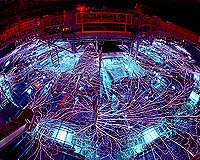 |
Exeter, N.H. (UPI) May 21, 2010 Nuclear pioneer Edwin Kintner, who helped develop a reactor for the first U.S. atomic-powered submarine, died at age 90 in Exeter, N.H., his family said. Kintner died May 7 of prostate cancer, his son Eric told The New York Times in a story published Friday. Edwin Kintner worked on reactor technology used to power the Nautilus, the first U.S. atomic submarine, which had its maiden voyage Jan. 17, 1955. "To produce Nautilus, it was necessary to expand man's knowledge far beyond the 'known' in almost every technical area - physics, metallurgy, mechanical engineering, electronics, environmental medicine," Kintner wrote in an article for The New York Times Magazine in 1965. Kintner also worked for the Atomic Energy Commission, was head of the U.S. Department of Energy's fusion program and was named to oversee the cleanup when the reactor core failed at the Three Mile Island nuclear station near Harrisburg, Pa., in March 1979. Kintner was born in Paris, Ohio, graduated from the U.S. Naval Academy and earned masters' degrees in naval construction, ocean engineering and physics at the Massachusetts Institute of Technology. Besides his son Eric, of Westford, Mass., he is survived by his wife, Alice, of Exeter, N.H.; sons John of Fort Lauderdale, Fla., and Peter, of Park City, Utah; and daughter, Mary, of Underhill, Vt.
Share This Article With Planet Earth
Related Links Understanding Time and Space
 Nuclear fusion: North Korea claims Holy Grail of energy
Nuclear fusion: North Korea claims Holy Grail of energyParis (AFP) May 12, 2010 North Korea's claim on Wednesday to have carried out nuclear fusion touches on a vision of cheap, green, endless energy that is mustering billions of research dollars among advanced economies and, say experts, may take decades to achieve. Instead of splitting the atom - the principle behind the atomic bomb and present-day nuclear reactors - fusion entails ramming the nuclei of light atomic ... read more |
|
| The content herein, unless otherwise known to be public domain, are Copyright 1995-2010 - SpaceDaily. AFP and UPI Wire Stories are copyright Agence France-Presse and United Press International. ESA Portal Reports are copyright European Space Agency. All NASA sourced material is public domain. Additional copyrights may apply in whole or part to other bona fide parties. Advertising does not imply endorsement,agreement or approval of any opinions, statements or information provided by SpaceDaily on any Web page published or hosted by SpaceDaily. Privacy Statement |